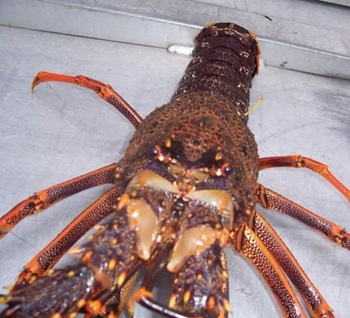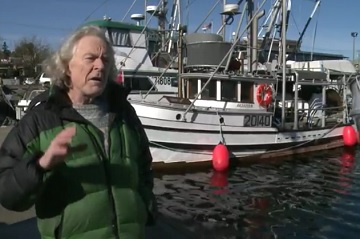Tag Archives: Commercial Lobster Industry
Inside Canada’s lobster wars
 Nighttime provides ideal cover for acts of sabotage in the sleepy fishing villages along the southern shores of Nova Scotia. Slashed buoys, stolen lobster crates, mysterious fires. These are just some of the acts of vandalism on the wharves where lobster fishers have been locked in battle for more than three decades. Lobstermen have a simple way of framing the dispute: think of the ocean’s bounty like a pie. They are asking who should get a piece, and what is the fairest way to divide it between the white Canadians who built the commercial lobster industry and the indigenous people who were historically left out. The Canadian government, which regulates fisheries, has been reluctant to settle the politically fraught issue, alienating warring fishers on both sides. Photos, more, >>CLICK TO READ<< 06:29
Nighttime provides ideal cover for acts of sabotage in the sleepy fishing villages along the southern shores of Nova Scotia. Slashed buoys, stolen lobster crates, mysterious fires. These are just some of the acts of vandalism on the wharves where lobster fishers have been locked in battle for more than three decades. Lobstermen have a simple way of framing the dispute: think of the ocean’s bounty like a pie. They are asking who should get a piece, and what is the fairest way to divide it between the white Canadians who built the commercial lobster industry and the indigenous people who were historically left out. The Canadian government, which regulates fisheries, has been reluctant to settle the politically fraught issue, alienating warring fishers on both sides. Photos, more, >>CLICK TO READ<< 06:29
Southern crayfish industry impacted by Australia’s re-entry into Chinese market
 The re-entry of Australian rock lobster into the Chinese market has adversely impacted on the southern rock lobster industry, with prices decreasing, an industry leader says. Australia was banned from exporting lobster and several other products to China in 2020, soon after then Australian Prime Minister Scott Morrison called for an investigation into the origins of the coronavirus pandemic. However, in late 2024 China told Australia the live rock lobster trade could resume. Kathryn Bell, chief executive of the Cra8 Rock Lobster Industry Association which encompasses the lower South Island and south Westland, said in just five weeks 1500 tonnes of Australian lobster had entered the Chinese market — more than half of New Zealand’s total commercial catch for the year. more, >>CLICK TO READ<< 12:46
The re-entry of Australian rock lobster into the Chinese market has adversely impacted on the southern rock lobster industry, with prices decreasing, an industry leader says. Australia was banned from exporting lobster and several other products to China in 2020, soon after then Australian Prime Minister Scott Morrison called for an investigation into the origins of the coronavirus pandemic. However, in late 2024 China told Australia the live rock lobster trade could resume. Kathryn Bell, chief executive of the Cra8 Rock Lobster Industry Association which encompasses the lower South Island and south Westland, said in just five weeks 1500 tonnes of Australian lobster had entered the Chinese market — more than half of New Zealand’s total commercial catch for the year. more, >>CLICK TO READ<< 12:46
Commercial lobster fishers want total catch cut to help save WA fishery
 Commercial fishers in Western Australia’s $285 million lobster industry say warning bells are ringing for the sector’s future sustainability, despite reassurances from state government scientists that stocks are at healthy levels. The commercial lobster industry is concerned due to the number of baby lobster, known as puerulus, being found along the coast, along with falling catch rates and revised economic modelling. As a result, the industry has requested its total catch be dropped next season from the current limit of 7,300 tonnes to 6,800 tonnes. Cervantes based fisher Michael Thompson supported the catch reduction and said it could have gone lower. “Our puerulus since 2007 till today is 50 per cent lower than what we used to receive back to the coast to our collectors,” he said. Photos, more, >>CLICK TO READ<< 10:02
Commercial fishers in Western Australia’s $285 million lobster industry say warning bells are ringing for the sector’s future sustainability, despite reassurances from state government scientists that stocks are at healthy levels. The commercial lobster industry is concerned due to the number of baby lobster, known as puerulus, being found along the coast, along with falling catch rates and revised economic modelling. As a result, the industry has requested its total catch be dropped next season from the current limit of 7,300 tonnes to 6,800 tonnes. Cervantes based fisher Michael Thompson supported the catch reduction and said it could have gone lower. “Our puerulus since 2007 till today is 50 per cent lower than what we used to receive back to the coast to our collectors,” he said. Photos, more, >>CLICK TO READ<< 10:02

Maine: Whale rules, pending lawsuits focus of gloomy Lobster Advisory Council meeting
A complicated and potentially grim future is predicted for the commercial lobster industry, with environmental groups, gear changes, the closure of offshore waters to lobster fishing and judicial rulings painting a “doom and gloom” picture, in the words of Department of Marine Resources Commissioner Patrick Keliher. “I think there’s going to be a lot of moving pieces,” Some of those pieces could spell the end of the commercial lobster fishery in Maine, DMR Deputy Commissioner Meredith Mendelson said, as she ran through the current lawsuits aimed at preserving the North Atlantic right whale. If any or all prevail, the lobster fishery will bear the brunt of the results. >click to read< 08:12

Commercial Lobster Industry to be heard at Potlotek First Nation challenge to the Fisheries Act
The Supreme Court of Nova Scotia granted the United Fisheries Conservation Alliance application for intervenor status in the court case brought by the small Cape Breton first nation against the Attorney General of Canada. Potlotek is seeking to have the court prevent Fisheries and Oceans Canada (DFO) from enforcing Fisheries Act regulations on its members, which it claims are an infringement on its treaty right to make a moderate livelihood off marine resources.,, Potlotek opposed allowing representatives of the commercial industry to intervene,,, The Supreme Court found that the group representing commercial fishermen should be allowed to be heard. >click to read< 07:50














































